2020人教新目标九年级英语上unit2单元语法聚焦
人教版九年级英语上册Unit2词汇梳理+短语总结+用法归纳
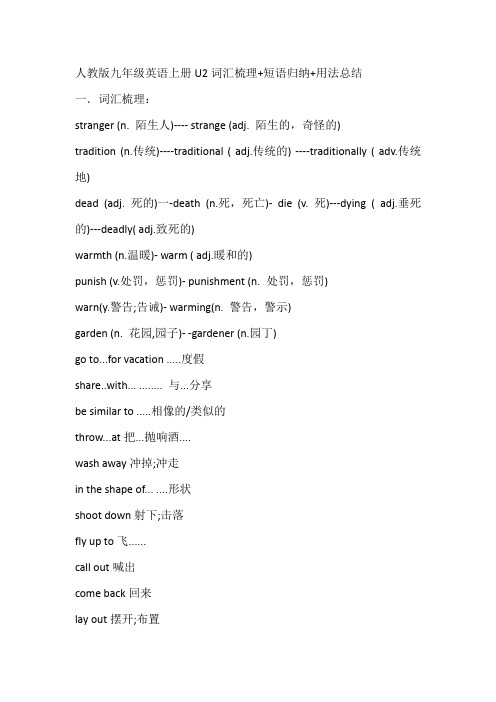
人教版九年级英语上册U2词汇梳理+短语归纳+用法总结一.词汇梳理:stranger (n. 陌生人)---- strange (adj. 陌生的,奇怪的)tradition (n.传统)----traditional ( adj.传统的) ----traditionally ( adv.传统地)dead (adj. 死的)一-death (n.死,死亡)-die (v. 死)---dying ( adj.垂死的)---deadly( adj.致死的)warmth (n.温暖)- warm ( adj.暖和的)punish (v.处罚,惩罚)- punishment (n. 处罚,惩罚)warn(y.警告;告诫)- warming(n. 警告,警示)garden (n. 花园,园子)--gardener (n.园丁)go to...for vacation .....度假share..with... ........ 与...分享be similar to .....相像的/类似的throw...at把...抛响酒....wash away冲掉;冲走in the shape of... ....形状shoot down射下;击落fly up to飞......call out喊出come back回来lay out摆开;布置put on增加(体重);发胖as a result结果;因此the importance of... ....的重要性play a tick/tricks on ..搞恶作剧wake up醒来,把.....唤醒give birth to生孩于;产付the beginning of.. ...的开始remind sb. of..使某人想起.... dress up装扮end up最终成为,最后处于care about关心;在意eat out出去吃饭find out弄清(情况)have good luck交好运on the earth在地球上a symbol of... ..的象征between... and..在.... ....之间not only. .. but also. ..不....而且... give out分发;散发in +时间段...之后give sb. sth. 给某人某物plan to do sth.计划做某事refuse to do sth. 拒绝做某事sound like +n.听起来.....What do/ des..think of..? ......怎么样make sb. do sth.让某人做某事warn sb. (not) to do sth.警告某人(不要)做某事promise to do sth. 承诺做某事decide to do sth.决定做某事。
人教新目标初三英语知识点归纳:Unit 2

人教新目标初三英语知识点归纳:Unit 1
2.By: ①通过…..方式(途径)。
例:I learn English by listening to tapes.
②在…..旁边。
例:by the window/the door
③乘坐交通工具例:by bus/car
④在……之前,到……为止。
例:by October在10月前
⑤被例:English is spoken by many people.
3.how与what的区别:
how通常对方式或程度提问,意思有:怎么样如何,通常用来做状语、表语。
what通常对动作的发出者或接受者提问,意思为什么,通常做宾语,主语。
How is your summer holiday? It’s OK.(how表示程度做表语)
How did you travel around the world? I travel by air.
What do you learn at school? I learn English, math and many other subjects.
4.aloud, loud ,loudly 均可做副词。
aloud 出声地大声地多与read 、speak连用例如:read aloud 朗读 speak aloud说出声来 loud 大声地响亮地 loudly 高声地多指喧闹声和不悦耳的声音。
以上就是为大家整理的人教新目标初三英语知识点归纳:Unit 1,怎么样,大家还满意吗?希望对大家的学习有所帮助,同时也祝大家学习进步,考试顺利!。
2020人教新目标版九年级英语上unit2单元知识详解

【文库独家】上九年级英语Unit2 I think that mooncakes are delicious!1.给出个人反应give a personal reaction2.泼水节the Water Festival3.龙舟节the Dragon Boat Festival4.春节the Spring Festival5.灯笼节the Lantern Festival6.在泰国/香港/北京in Thailand/Hong Kong/Beijing7.多么美好的一天! What a great day!8.一点 a little/ a bit/ a little bit9.看望亲戚/朋友/同学visit relatives/friends/classmates10.出去吃饭eat out/ go out for dinner11.在六月in June12.在(某人的)假期on the /one’s vacation13.一天吃五餐eat five meals a day14.看着很有意思be fun to watch15.增加(体重)/发胖/穿上put on16.在两周以后in two weeks(将来时)after two weeks (过去时)after +点(将来时或过去式)17.听起来像… sound like+n或句子18.一年最热的月the hottest month of the year19.从…到… from …to…20.和…相似be similar to/ be the same as21.…的时间the time of22.在街道上in /on the street 23.把某物扔给某人/某地throw sth to sb / sp24.把某物向某人扔去throw sth at(带情感)25.彼此互相each other26.…..的时候 a time for doing27.洗掉… wash away28.(有)好运(have)good luck29.满月 a full moon30.品尝月饼enjoy mooncakes.31.好几世纪for centuries32.呈/以……的形状in the shape of33.把…带给… carry sth to sb34.传统的民间故事traditional folk stories35.…的故事the story of…36.最令人感动的the most touching37.射掉shoot down38.给某人某物give sb. sth./give sth. to sb.39.(为做某事)感谢某人thank sb.(for doing sth.)(通过做)感谢某人thank sb. by doing sth.40.计划做… plan to do sth41.设法偷try to steal42.不在家be not home43.拒绝做… refuse to do sth44.飘向… fly up to45.对…喊出call out one’s name to…46.摆开/布置lay out sth in /on /at47.回来come back/ be back/ get back48.……的传统the tradition of…49.赏月admire the moon50.结果as a result51.一个……另一个……one …the other…52.五月第二个星期the second Sunday of May53.六月第三个星期天the third Sunday of June54.母亲节/父亲节Mother’s Day/Father’s Day55.给…礼物give gifts to sb56.带…出去吃饭take sb out for dinner/lunch57.越来越受欢迎more and more popular58.展示/表达我们的爱show our love59.花很多的钱spend a lot of money60.帮助…做…help (to) do sth/help with sth61.打扮/装扮dress up62.装扮成卡通人物dress up as a sb63.不招待就使坏trick and treat64.看上去吓人/可怕look scary65.关上/打开/调高/调低turn off/on/up/down66.把……放在…..周围put sth. around …67.寻求……ask for…68.开某人玩笑play a trick /a joke on ab.69.了解learn about70.在北美in North America71.给某人款待give sb. a treat72.考虑think of73.…的真正意义the true meaning of…74.……的重要性the importance of doing sth.75.(….的)最好的例子the best example(of )76.只想着自己only think about oneself77.对别人友好treat others nicely78.关心/关注care about79.挣(更多)钱make (more) money80.过去常常… used to do sth.81.受到惩罚be punished82.处某人以… punish sb. with/by…83.因…而处罚某人punish sb. for…84.告诫…去做… warn sb. to do85.提醒…要注意… warn sb. about sth.86.警告…不要做… warn sb. not to do87.最终成为end up88.期待…做… expect sb. to do sth.89.带回到… take back…90.把…带回到… take sb back to sp91.使…想起… remind sb of sth/ sb92.提醒某人做… remind sb to do sth93.醒来wake up94.查明/弄清情况find out95.决定做… decide to do sth96.改变…的生活chan ge one’s life97.承诺做… promise to do sth98.真需要in need99.…对待… treat sb with +adj 100.…的开端the beginning of101.产生新生命give birth to life 102.…的象征 a symbol of 103.不但…而且not only … but (also)104.结果as a result105.圣诞节前夕Christmas Eve二、重点句型1. I think tha t they’ re fun to watch.我认为它们看着很有意思。
人教版新目标英语九年级上册《Unit 2 I think that mooncakes are delicious!》单元词句总结
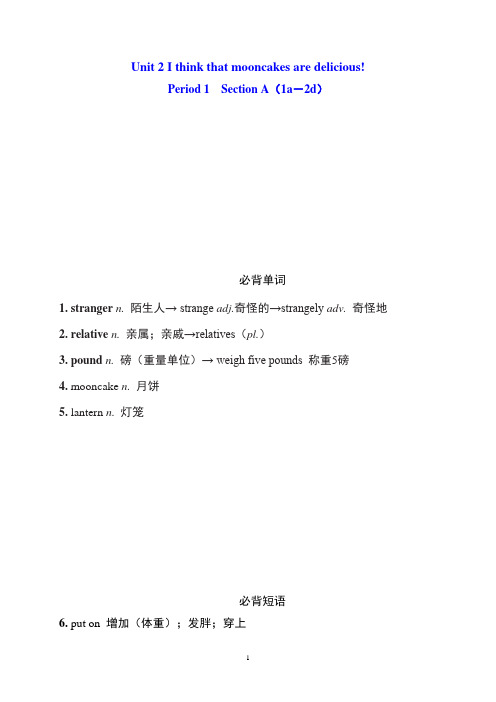
Unit 2 I think that mooncakes are delicious!Period 1 Section A(1a-2d)必背单词1. stranger n. 陌生人→ strange adj.奇怪的→strangely adv. 奇怪地2. relative n. 亲属;亲戚→relatives(pl.)3. pound n. 磅(重量单位)→ weigh five pounds 称重5磅4. mooncake n. 月饼5. lantern n. 灯笼必背短语6. put on 增加(体重);发胖;穿上7. be similar to与……相似= take after8. throw... at...把……抛向/泼向/洒向……9. wash away冲掉;冲走必背句子10.Bill wonders whether they’ll have zongzi again next year.比尔想知道明年他们是否还会吃粽子。
11. I wonder if it’s similar to the Water Festival of the Dai people in Yunnan Province.我想知道它是否和云南省傣族人的泼水节相似。
Period 2 Section A(3a-3c)必背单词1. steal v. 偷;窃取→stole,stolen(过去式及过去分词)2. lay v.放置;安放;产(卵);下(蛋)→laid,laid (过去式及过去分词)→lay an egg 下蛋→lay out 摆开;布置3. dessert n.(饭后)甜点;甜食4. garden n. 花园;园子→gardener n. 园丁5. admire v. 欣赏;仰慕→look up to sb. 仰慕某人6. folk adj.民间的;民俗的7. goddess n.女神8. whoever pron.无论谁;不管什么人9. tradition n.传统必背短语10. in the shape of...呈……的形状11. shoot down射下12. fly up to...飞到……13. call out 叫喊;大声说出14. as a result结果必背句子15. Chinese people have been celebrating the MidAutumn Festival andenjoying mooncakes for centuries.中国人庆祝中秋节吃月饼已经好几个世纪了。
九年级上册unit2语法归纳
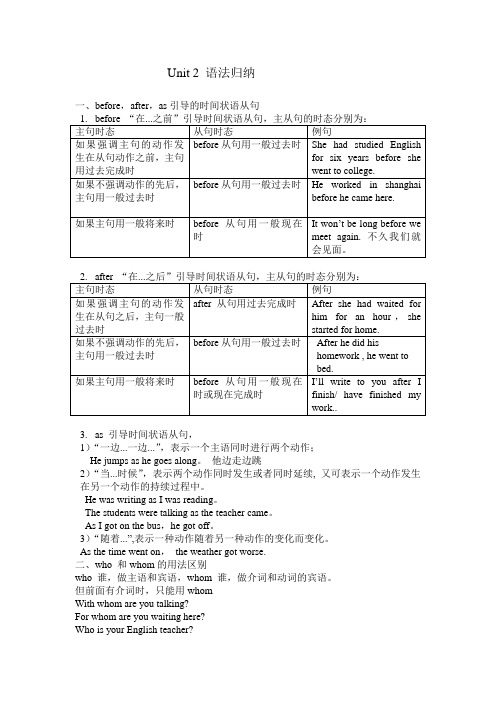
Unit 2 语法归纳一、before,after,as引导的时间状语从句1.before “在...之前”引导时间状语从句,主从句的时态分别为:主句时态从句时态例句如果强调主句的动作发生在从句动作之前,主句用过去完成时before从句用一般过去时She had studied Englishfor six years before shewent to college.如果不强调动作的先后,主句用一般过去时before从句用一般过去时He worked in shanghaibefore he came here.如果主句用一般将来时before 从句用一般现在时It won’t be long before we meet again. 不久我们就会见面。
2.after “在...之后”引导时间状语从句,主从句的时态分别为:主句时态从句时态例句如果强调主句的动作发生在从句之后,主句一般过去时after 从句用过去完成时After she had waited forhim for an hour,shestarted for home.如果不强调动作的先后,主句用一般过去时before从句用一般过去时After he did hishomework , he went tobed.如果主句用一般将来时before 从句用一般现在时或现在完成时I’ll write to you after I finish/ have finished my work..3.as 引导时间状语从句,1)“一边...一边...”,表示一个主语同时进行两个动作;He jumps as he goes along。
他边走边跳2)“当...时候”,表示两个动作同时发生或者同时延续, 又可表示一个动作发生在另一个动作的持续过程中。
He was writing as I was reading。
The students were talking as the teacher came。
人教版九年级上册unit2知识点总结

人教版九年级上册unit2知识点总结人教版九年级上册Unit 2《How often do you exercise?》知识点总结在人教版九年级上册Unit 2中,我们学习了关于频率的表达以及一些与日常活动相关的单词和短语。
本文将对这些知识点进行总结。
首先,我们来讨论关于频率的表达。
英语中,我们可以用副词来表达某个活动的频率,常见的副词有:always、usually、often、sometimes、rarely和never。
这些副词可以用来回答关于频率的问题,比如"How often do you exercise?"(你多久锻炼一次?)".I always exercise three times a week."(我每周锻炼三次。
)。
另外,我们还可以通过使用频率副词词组来表示不同程度的频率,比如:once a day(每天一次)、twice a week(每周两次)等。
其次,我们学习了一些与日常活动相关的单词和短语。
比如,我们可以用watch TV(看电视)、play sports(进行体育运动)、surf the Internet(上网冲浪)等来描述我们的日常活动。
另外,我们还学习了一些与运动和锻炼相关的单词和短语,比如:go jogging(去慢跑)、do yoga(做瑜伽)等。
除此之外,我们还学习了一些表示频率的动词,比如:exercise (锻炼)、swim(游泳)、dance(跳舞)等。
这些动词可以用来回答关于频率的问题或者描述我们的日常活动。
在学习这些知识点的过程中,我们还进行了一些实践活动,比如问卷调查。
通过这些实践活动,我们可以更加深入地理解和运用这些知识点。
我们可以设计一个关于频率的问卷调查,来了解同学们各种活动的频率和喜好。
此外,我们还学习了一些表示频率的词组和句型,比如:twice a week(一周两次)、once a month(一个月一次)、every day(每天)、most of the time(大部分时间)、on weekends(在周末)等。
2020年人教版英语九年级Unit2知识点讲解
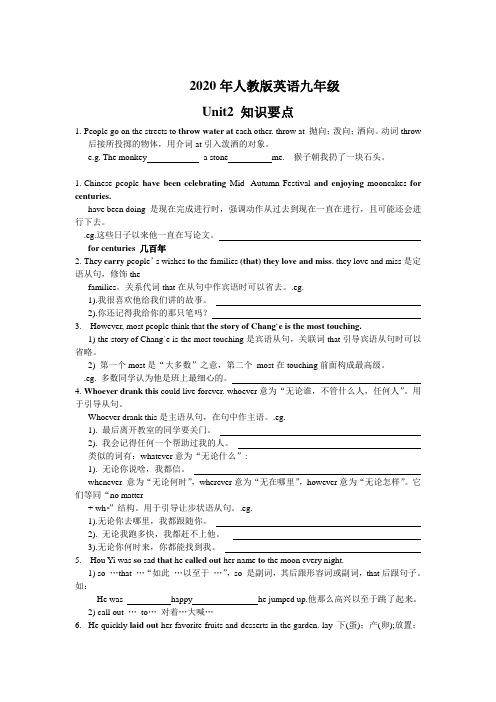
2020年人教版英语九年级Unit2 知识要点1.People go on the streets to throw water at each other. throw at 抛向;泼向;洒向。
动词throw后接所投掷的物体,用介词at引入泼洒的对象。
e.g. The monkey a stone me. 猴子朝我扔了一块石头。
1.Chinese people have been celebrating Mid -Autumn Festival and enjoying mooncakes for centuries.have been doing 是现在完成进行时,强调动作从过去到现在一直在进行,且可能还会进行下去。
.eg.这些日子以来他一直在写论文。
for centuries 几百年2.They carry people’s wishes to the families (that) they love and miss. they love and miss是定语从句,修饰thefamilies。
关系代词that在从句中作宾语时可以省去。
.eg.1).我很喜欢他给我们讲的故事。
2).你还记得我给你的那只笔吗?3. However, most people think that the story of Chang`e is the most touching.1) the story of Chang`e is the most touching是宾语从句,关联词that引导宾语从句时可以省略。
2) 第一个most是“大多数”之意,第二个most在touching前面构成最高级。
.eg. 多数同学认为他是班上最细心的。
4.Whoever drank this could live forever. whoever意为“无论谁,不管什么人,任何人”。
用于引导从句。
Whoever drank this是主语从句,在句中作主语。
九年级人教版英语上册Unit2语法知识点

九年级人教版英语上册Unit2语法知识点在英语学习中,语法是一个非常重要的部分。
九年级人教版英语上册Unit 2中,我们学习了许多语法知识点,如一般现在时、一般过去时、现在进行时、一般将来时等。
这些语法知识点对于我们正确运用时态和句子结构,起着关键的作用。
首先,我们来学习一般现在时。
一般现在时表示经常性或习惯性的动作、常识和规律等。
例如:I often go to school by bus. 这句中的"often"表示频率副词,用来说明动作的频率。
我们还可以用一些表示频率的词来增强语气,如Always, usually, sometimes等。
此外,一般现在时还可以用于表示客观真理或普遍事实。
例如:The sun rises in the east.接下来是一般过去时。
一般过去时用于表示过去某个时间发生的动作或存在的状态。
一般过去时的动词主要有两种过去式形式:规则动词过去式和不规则动词过去式。
规则动词过去式是在动词后面加-ed。
例如:I studied English last night. 不规则动词过去式是在动词基本形式的基础上进行变化。
例如:I saw a movie last weekend. 需要注意的是一些特殊状语的使用,如yesterday, last week, last month等。
这些用于表示过去时间的状语可以帮助我们正确使用一般过去时。
除了一般现在时和一般过去时,我们还要学习现在进行时。
现在进行时用于表示说话时正在进行的动作或事情。
现在进行时的构成是“be动词+动词的ing形式”。
例如:I am reading a book now. 需要注意的是,现在进行时一般不与表示状态的动词一起使用,而是和表示动作或状态变化的动词一起使用。
最后,我们来学习一般将来时。
一般将来时用来表示将来某个时间或将来的计划。
一般将来时的构成是“will+动词原形”。
例如:I will go to the park tomorrow. 需要注意的是,一般将来时经常与表示将来时间的状语搭配使用,如tomorrow, next week, in the future 等。
人教版九年级上册Unit2语法、阅读、写作专题

人教版(新目标)九年级上册Unit2语法、阅读、写作专题=语法专题宾语从句(一)1.宾语从句的种类●宾语从句是一种名词性从句,在句中作及物动词、介词,或形容词的宾语。
●根据引导宾语从句的连词不同,宾语从句可以分为三类。
(1)由that引导的宾语从句。
that只有语法作用,没有实际意义,在口语和非正式文体中可以省略。
She doesn't know(that)she is seriously ill.她不知道她病得很重I am sure(that)he will succeed.我相信他会成功的。
(2)由连接代词who, whom, whose, what, which和连接副词when, where, why, how引导的宾语从句。
这些连接代词和连接副词在宾语从句中充当某种成分。
Do you know who/whom they are waiting for? 你知道他们正在等谁吗?I don't know what they are going to do.我不知道他们打算做什么。
(3)由if或 whether引导的宾语从句。
if和 whether在句中的意思是“是否”。
He asked me whether/if I could help him.他问我是否可以帮助他。
2.宾语从句的语序宾语从句的语序应为陈述语序例:I don't know if the boy has a younger sister.我不知道那个男孩儿是否有个妹妹。
Let's first decide where we should go.让我们先决定我们应该到什么地方去。
3.宾语从句的时态(1)如果主句的时态用一般现在时,宾语从句该用什么时态就用什么时态。
例:I don't think(that)you are right.我认为你是错的。
(2)如果主句的时态是一般过去时,宾语从句要用相应的过去时态(一般过去时、过去进行时、过去将来时或过去完成时)。
初三英语上册(人教新目标)Unit 2 I think that mooncakes are delicious! 知识点总结
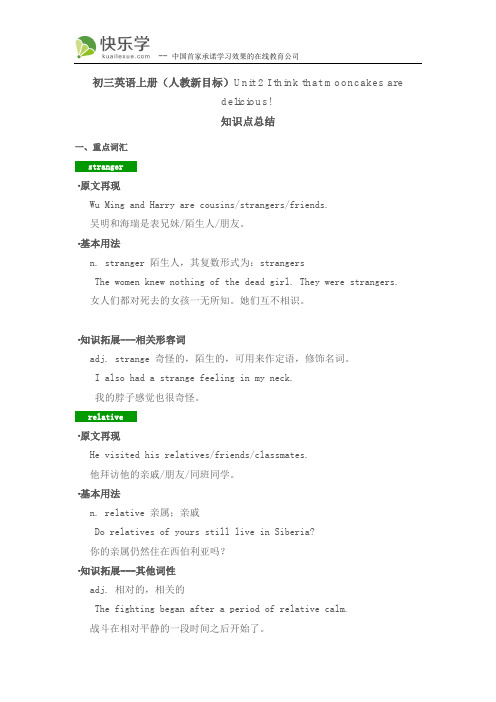
初三英语上册(人教新目标)Unit 2 I think that mooncakes aredelicious!知识点总结一、重点词汇stranger·原文再现Wu Ming and Harry are cousins/strangers/friends.吴明和海瑞是表兄妹/陌生人/朋友。
·基本用法n. stranger 陌生人,其复数形式为:strangersThe women knew nothing of the dead girl. They were strangers.女人们都对死去的女孩一无所知。
她们互不相识。
·知识拓展---相关形容词adj. strange 奇怪的,陌生的,可用来作定语,修饰名词。
I also had a strange feeling in my neck.我的脖子感觉也很奇怪。
relative·原文再现He visited his relatives/friends/classmates.他拜访他的亲戚/朋友/同班同学。
·基本用法n. relative 亲属;亲戚Do relatives of yours still live in Siberia?你的亲属仍然住在西伯利亚吗?·知识拓展---其他词性adj. 相对的,相关的The fighting began after a period of relative calm.战斗在相对平静的一段时间之后开始了。
steal·原文再现…tried to steal the medicine when Hou Yi was not home.……当后羿不在家的时候试着去偷药。
·基本用法vt. steal 偷;窃取,其后可以直接跟宾语。
(过去式: stole 过去分词: stolen 现在分词: stealing 第三人称单数: steals)My purse was stolen in the fair.我的钱包在赶集时被人偷走了。
人教版九年级英语上册课件:Unit 2单元语法小专题(Grammar Focus)
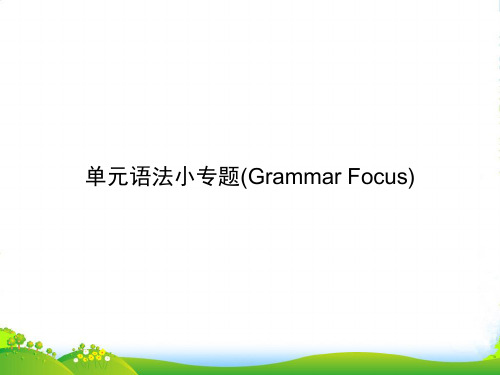
take you to dinner,but I won’t finish
working until ten o’clock.
• A.that
• B.if
• C.what
• D.why
• Ⅲ.句型转换。 • 1.Can they speak French?I want to
know.(合为一句)
• I waFnrtetnockhn.iof/wwhether they can speak
• 4.How clever boys your class has!
• Ⅱ.单项选择。
• A( )1.—
sweet music!
• —And I really like the TV program The Voice of China.
• A.What
• B.What a
• C.How
• D.How a
• He asked the laif/dwyhether she
was
doing the dishes.
• 4.They are happy to see each other.(改为感叹句)
• Hootwherh! appy
they are to see each
• 5.She is a kind girl.(改为感叹句)
• 我认为杰克不能独立完成他的家庭作业。
• Ⅰ.用what,what a(n)或how填空。 • 1.How fast you run!
• 2W.hat a pretty girl your daughter is!
What
• 3. moWmheatnt!
good news it is at the
九年级英语人教版全册 Unit2_语法聚焦
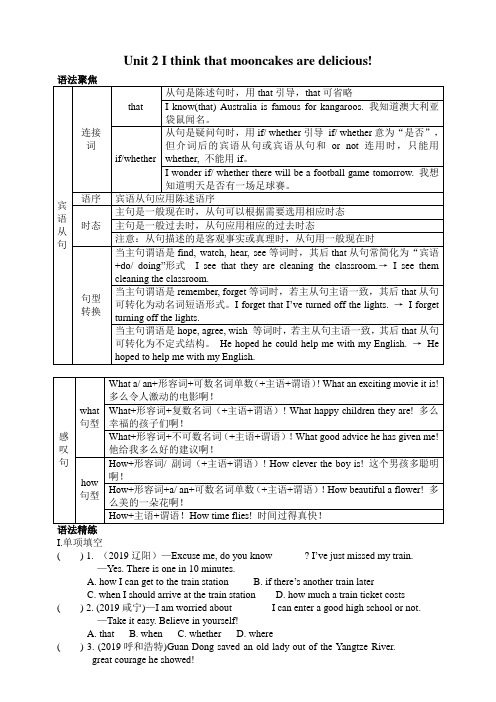
句型
How+形容词/副词(+主语+谓语)!How clever the boy is!这个男孩多聪明啊!
How+形容词+a/ an+可数名词单数(+主语+谓语)!How beautiful a flower!多么美的一朵花啊!
How+主语+谓语!How time flies!时间过得真快!
语法精练
从句是疑问句时,用if/ whether引导if/ whether意为“是否”,但介词后的宾语从句或宾语从句和or not连用时,只能用whether,不能用if。
Iwonder if/ whether there will be a football game tomorrow.我想知道明天是否有一场足球赛。
C.when I should arrive at the train stationD.how much a train ticket costs
( ) 2.(2019咸宁)—Iam worried about _______ I can enter a good high school or not.
—___right they are
C. What bright they are
参考答案
I. 1-5BCBAB
当主句谓语是remember, forget等词时,若主从句主语一致,其后that从句可转化为动名词短语形式。Iforget that I’ve turned off the lights.→Iforget turning off the lights.
当主句谓语是hope, agree, wish等词时,若主从句主语一致,其后that从句可转化为不定式结构。He hoped he could help me with my English.→He hoped to help me with my English.
人教版新目标九年级全一册Unit 2 重点短语和句型
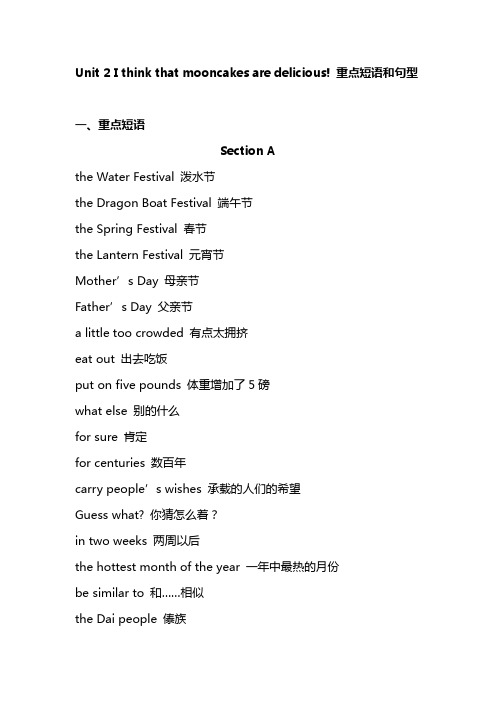
Unit 2 I think that mooncakes are delicious! 重点短语和句型一、重点短语Section Athe Water Festival 泼水节the Dragon Boat Festival 端午节the Spring Festival 春节the Lantern Festival 元宵节Mother’s Day 母亲节Father’s Day 父亲节a little too crowded 有点太拥挤eat out 出去吃饭put on five pounds 体重增加了5磅what else 别的什么for sure 肯定for centuries 数百年carry people’s wishes 承载的人们的希望Guess what? 你猜怎么着?in two weeks 两周以后the hottest month of the year 一年中最热的月份be similar to 和……相似the Dai people 傣族throw water at each other 互相泼水wash away bad things 洗去晦气have good luck in the new year 在新的一年交好运celebrate the Mid-Autumn Festival 庆祝中秋节in the shape of a full moon 一轮满月的形状on the Mid-Autumn night 在中秋节的晚上traditional folk stories 传统民间故事shoot down 射下magic medicine 仙药live forever 长生不老plan to do sth. 计划做某事refuse to do sth. 拒绝做某事lay out 摆开;布置start the tradition of ... 开始……的传统admire the moon 赏月Section B celebrate Halloween 庆祝万圣节create a mind-map 创建思维导图trick or treat 不给糖就捣乱light candles 点燃蜡烛play a trick on sb. 捉弄某人give sb. a treat 款待某人dress up as cartoon characters 装扮成卡通人物the true meaning of Christmas 圣诞节的真正含义care about 关心;在意make more money 赚更多的钱Christmas Eve 平安夜business partner 生意伙伴Western countries 西方国家end up 最终成为;最后处于expect sb. to do sth. 期待某人做某事take him back to his childhood 把他带回到童年remind sb. of sth. 提醒某人某事wake up 叫醒decide to do sth. 决定做某事promise to do sth. 承诺做某事celebrate Christmas with his relatives 和他的亲戚们一起庆祝圣诞节give gifts to people in need 把礼物给需要的人give birth to 赋予生命warn sb. (not) to do sth. 警告某人(不)做某事treat everyone with kindness and warmth 对待每一个人都充满善意和温暖spread love and joy 传播爱和快乐not only... but also... 不仅......而且......hiding places 隐藏地二、重点句型Section A1.How fantastic these dragon boat teams were! 这些龙舟队多棒啊!2.I wonder whether they will have races again next year.我想知道明年他们是否还会举办比赛。
2020人教新目标九年级英语上unit2知识提纲

【文库独家】Unit 2 Section A (1a-2d) 知识提纲一、词性转换1. strange adj. 陌生的→n. stranger 陌生人二、词法及句型1. little 后接(u)n 不可数名词“很少,几乎没有”表示否定含义。
a little . 后接(u)n 不可数名词“一点儿,”表示肯定含义。
few 后接(c)n.pl. 可数名词复数“很少,几乎没有”表示否定含义。
a few 后接(c)n.pl. 可数名词复数“有几个,有一些”表示肯定含义。
—Is your friend Tom still in Australia ?—I don’t know . I have information about him because we haven’t seeneach other for years .A a little , a fewB little , a fewC a few , a littleD few , a little2. put (pt. put pp. put ) 放put sth + 地点(用介词短语表示)I put my bike under the tree . 我把自行车放在了树下。
put on 增加(体重),发胖穿上,上演I can eat whatever I want , but I never put on weight .我想吃什么就吃什么,但是体重从来不增。
与put 有关的短语还有put away 把……收起来put up 举起,张贴put off 推迟,延迟put down 放下,写下put out 熄灭,扑灭()your sunglasses , Sally .The sun is so bright .A Put down B. Put up C. Put away D. Put on3. in two weeks 两周后in + 一段时间表示“在……之后”用于一般将来时用How soon 提问She has gone to Beijing , and she will be back in two days .她去北京了,她将在两天后回来。
人教版(新目标)九年级第二单元英语语法总结
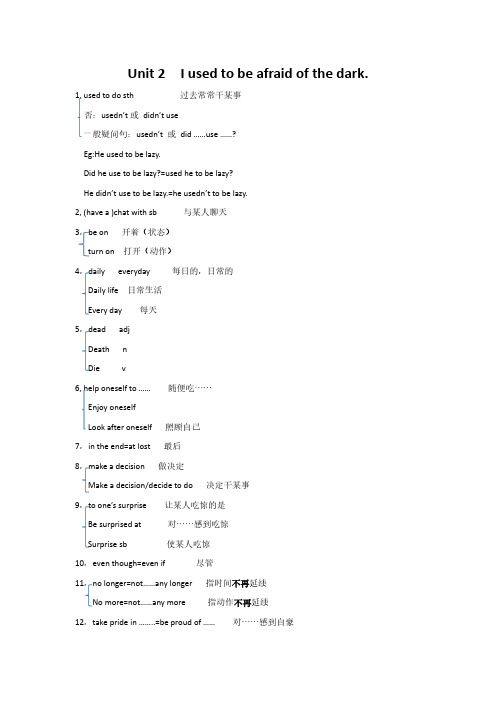
Unit 2 I used to be afraid of the dark. 1, used to do sth 过去常常干某事否:usedn’t或didn’t use一般疑问句:usedn’t 或did ……use ……?Eg:He used to be lazy.Did he use to be lazy?=used he to be lazy?He didn’t use to be lazy.=he usedn’t to be lazy.2, (have a )chat with sb 与某人聊天3,be on 开着(状态)turn on 打开(动作)4,daily everyday 每日的,日常的Daily life 日常生活Every day 每天5,dead adjDeath nDie v6, help oneself to ……随便吃……Enjoy oneselfLook after oneself 照顾自己7,in the end=at lost 最后8,make a decision 做决定Make a decision/decide to do 决定干某事9,to one’s surprise 让某人吃惊的是Be surprised at 对……感到吃惊Surprise sb 使某人吃惊10,even though=even if 尽管11,no longer=not……any longer 指时间不再延续No more=not……any more 指动作不再延续12,take pride in ……..=be proud of ……对……感到自豪13,pay attention to (doing) sth 注意干某事14,give up/stop doing sth 放弃做某事15,do sth for the first time 第一次干某事16,in +时间段……以后(用于将来时)用how soon 提问17,used to do sth 过去常常干某事Get/be used to doing sth 习惯于干某事Be used to do=be used for doing 被用于干某事18,感叹句:How +adj/adv +陈述句What +n/n短语+陈述句19,quiet 安静的,内向的Quite 真正的,真实的Quiet a/an……=a very20,the challenge of …….. ……的挑战21,mistake…….for……错把……当成……22,had batter (not) do sth 最好(别)做某事23,in the end=at lost 最后At the end of……在……末By the end of……到……末为止24,miss 想念,错过25,send…….to……把……送到……26,enough +n/n+enoughAdj+enough27, call sb 称呼把某人叫做……28,mind doing 介意干某事。
- 1、下载文档前请自行甄别文档内容的完整性,平台不提供额外的编辑、内容补充、找答案等附加服务。
- 2、"仅部分预览"的文档,不可在线预览部分如存在完整性等问题,可反馈申请退款(可完整预览的文档不适用该条件!)。
- 3、如文档侵犯您的权益,请联系客服反馈,我们会尽快为您处理(人工客服工作时间:9:00-18:30)。
【文库独家】
人教新目标九年级Unit 2 语法透视
use to 表示过去经常的习惯,但现在不再这样了,常译为“过去常常”,to是动词不定式符号,后接动词原形。
Li Ming used to do his homework on Sundays, but now he often does his homework on Saturdays. 李明过去经常星期天做作业,但是现在他经常星期六做作业。
I used to get up at half past six in the morning, but now I usually get up at seven. 我过去常常六点半起床,但是现在我通常七点钟起床。
1.其否定句为didn’t use to do或used not to do,used not可缩写为usedn’t。
Mr Li didn’t use to drink beer.
=Mr Li usedn’t to drink beer. 李先生不常喝啤酒。
ed to 的疑问句形式是“Did…use to do?”或“Used…to do”。
Did she use to get up early?
=Used he to get up early? 她过去经常早起吗?
ed to 的反意疑问句也用助动词did(n’t)或used(n’t)构成。
Maris used to be late for school, didn’t/usedn’t he?马里奥以前上学经常迟到,对不对?
典例题解
〖例1〗He used to_______ in the sun, but now he is used to ______ at night.
A. read, read
B. reading, read
C. read, reading
D. reading, reading
〖解析〗C。
本题考查used to do sth和be used to doing sth。
前者表示“过去常常做某事”,后者意为“习惯于做某事”。
由but now可知前一句说的是过去的情况,后一空说的是现在的情况。
〖例2〗I used to go outside on weekends. (改为否定句)
I____ ____ to go outside on weekends.
〖解析〗didn’t use/used not。
本题考查used to do的否定结构。
其否定句为didn’t use to do 或used not to do。
〖例3〗Mrs Green used to have long curly hair. (改为一般疑问句)
____ Mrs Green ____ to have long curly hair?
〖解析〗Did, use。
本题考查used to do的一般疑问句结构。
此句也可写成Used Mrs Green to have long curly hair?
语法精练
I. 用used to do, be used to do, be used to doing和括号内动词的正确形式填空。
1.You _____ (go) to work by bike, did you?
2.Wood can ____(make) clothes.
3.I think you will _____(live) in the countryside.
4.There ____(be) a quiet village.
5.They ____(read) Chinese for half an hour every morning.
6.My uncle ____ (work) in that factory before he left this city.
7.A colour TV set like that ____(cost) about 5,000 yuan.
8.We ____ (come) on foot, but we don’t do that now.
9.He ____(play) soccer when he was young.
10.This kind of knife ____(cut) things.
II. 用used to和括号内动词的正确形式补全对话。
Susan: Lily, you (1)_____(be) afraid of the dogs, didn’t you?
Lily: Yes, I did. But now I’m afraid of snakes.
Susan: What (2)_____ your mother (2)_____(be) afraid of?
Lily: She used to be afraid of dogs.
Susan: How about you aunt?
Lily: She (3)_____(be) afraid of going out at night.
Susan: (4)_____ your uncle (4)_____(be) afraid of going out at night?
Lily: No, he didn’t. He (5)_____(go) out at night because he often goes to work at night. What about you, Susan?
Susan: I used to be afraid of my mother, but now my teacher.
III.根据汉语提示,完成下列句子。
1.竹子用来造纸。
____________________________________
2.他过去经常是在六点以前就去上班了。
____________________________________
3.她过去通常一天只做一次饭。
____________________________________
4.他的女儿不习惯吃美国的饭菜。
____________________________________
5.我习惯步行,因为我没有汽车。
____________________________________
6.她习惯早上跑步。
____________________________________
参考答案
I.1.didn’t used to go 2.be used to make 3.be used to living ed to be 5.are used to reading
ed to work
ed to cost
ed to come
ed to play 10.is used to cut
ed to be 2.did, use to be ed to be 4.Did, use to be 5.is used to going
III.1.Bamboo is used to make paper.
2.He used to go to work before six in the morning.
3.She used to cook a meal only once a day.
4. His daughter is not used to American food.
5.I am used to walking because I don’t have a car.
6.She is used to running in the morning.。
